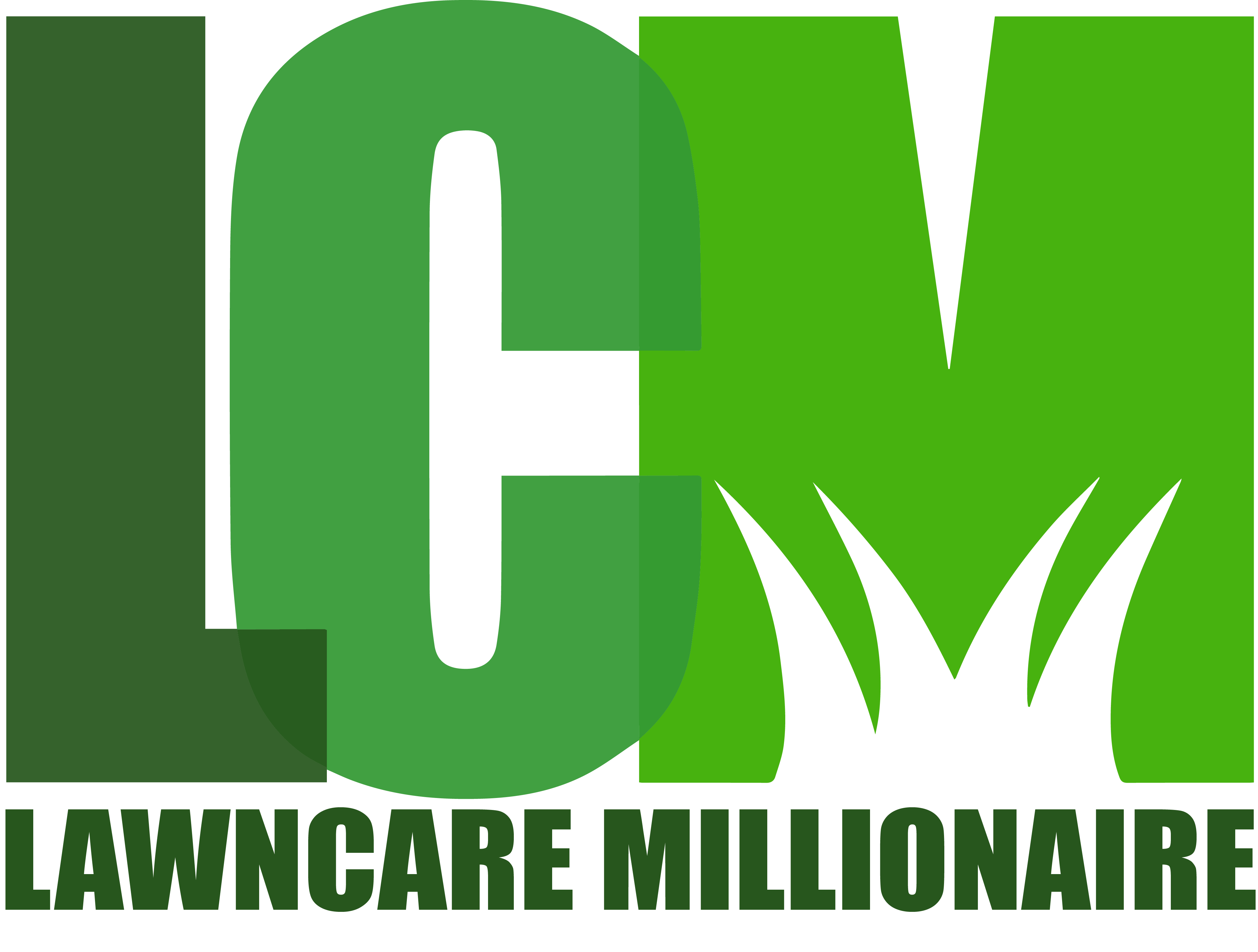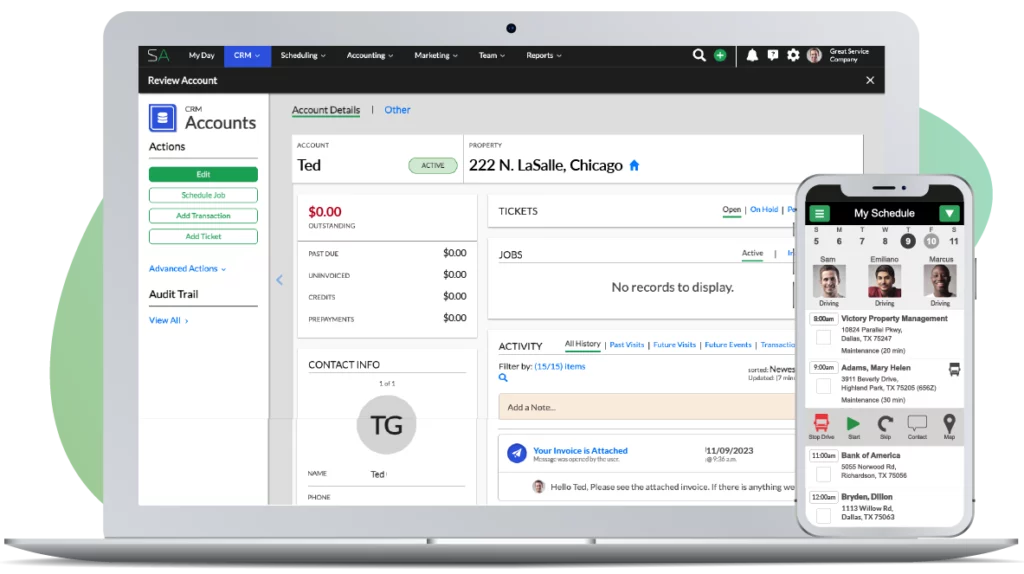“What do you do if a client says I will call you when the grass needs cut? Do you only offer weekly and bi-weekly cuts?”
Yes. We only offer weekly or bi-weekly cuts. We do not offer call in lawn
mowing or one-time lawn mowing.
“Or should I offer amazing service that is ready on a dime?”
Amazing service doesn’t mean that you give everyone everything they want.
Amazing service means that you give the clients that are the right match for you – your very best potential clients – amazing service.
You don’t owe anyone anything. Your job is to identify who are the very best clients for you (and I would suggest they are not one-time or call-in clients) and then find out what their needs and wants are and deliver to them amazing service.
Part of building a company is figuring out who you don’t want as a client. It takes a while.
But once you figure that out you can focus on being exceptional to the clients that matter most. And in return – those clients will lead you to other exceptional clients like themselves.
Trying to be awesome to everyone is a certain path to being awesome to no one.
All of this is easier said than done. All of it takes time. And in the beginning when you are trying to simply make your bills and you don’t have a
huge stream of steady new work you will have to make exceptions. However, as fast as you can you stop taking work from customers who are not your ideal client.
Also, consider this, every time you juggle your schedule and go out of your way to take exceptional care of a one time client you are using up your time and resources that could have been given to one of your current ‘ideal’ clients that is willing to pay you a lot of money for a long time.
Being awesome to clients that aren’t a perfect fit is actually unfair to all of your clients that really want to give you a steady stream of reliable business.
At our company our close rate bounces between 57% to 59% from month to month. Some clients decide to go with someone else because we are not the
right option for them – that’s fine. And often times we simply identify we are not an ideal fit for the prospect that called us.
The point is that once you determine who your ideal client is you can feel confident turning away business. Every time you turn away a less than ideal client or stop doing business with a less than ideal client your business becomes better.
“So I got a book with a chart in it that says what the going rate is for so many sqft”
This is a good place to start. But, be careful with the book. Track your own production times and compare them against the book. I’m not saying the
book will be wrong but I guarantee parts of it will be inaccurate for your business.
Likewise, the activity of paying attention to time vs equipment being used vs square feet is an important learning experience that will help you understand the numbers of your business – and ultimately price accurately.
“For the most part they (customers) seem to only be concerned about the grass length and not so much the well being of their lawns which is concerning because once winter gets here”
Some of these customers that are mowing only customers may still be good clients. You are on the right track — the better clients are those that buy multiple services — but these ‘mowing only’ clients may still have value.
Question… do you think these clients have the money to afford the extra services you want to sell? Are any of their neighbors buying these extra services?
No matter how well you present the reason why they need the service – if they don’t have the money they won’t buy.
Assuming they have the money. You don’t want to sell prevention. You want to sell immediate benefit(s).Take vitamins for example, many of us think they are probably worth taking but after 3 months of paying $40/mo if we don’t feel any different there is a good chance we will stop paying for them.
Even though we know they were probably worth taking. The same is true for the services you sell.
If you are selling prevention such as grub worms or year long ant treatments they are much harder to sell if the client doesn’t have an immediate need. Or a really bad past experience with grubs or ants.A small percentage of your clients will buy preventative services.
The only way to increase the percentage is with a very compelling story about why it should matter to them.Sometimes statistics help make the sell.
Such as 40% of children who play in the back yard are bitten by fire ants.
As I’m sure you’ve heard before… sell benefits not features.
The reason your clients want a green lawn is because the husband of the house is tired of his mother in law nit-picking how he provides for the family or the wife’s friend down the street has the nicest / greenest lawn on the street and everyone in the neighborhood is talking about it.
There is a reason your clients want their lawn fertilized and it has virtually nothing to do with it being healthy. Their real reason for buying a service you are selling will be based on emotion.
They will use logic – such as a healthy lawn is really important and a wise financial investment – to justify their buying decision.
But, like all of us, they will make their decision on emotion and justify it with logic. So health might be one of the reasons they will buy the service but it is not THE reason and it is rarely enough of a reason to make them buy.
I used fertilization as an example but apply this line of thought to every service you sell.
Also, when they say no. Ask them why they don’t feel it’s important. Listen to what they are telling you. After a while – you’ll hear a trend.
Once you figure out the common reason(s) you will have identified your selling points.
And then, when you are ready to become even more sophisticated, ask a few of your happy clients to give you a testimonial that speaks directly to how you wonderfully solved their problem (which is one of your main selling points) and use it on your marketing pieces.
That way someone else is doing the selling for you. It’s always more believable when someone other than the salesman says great things about the company and how the company has solved this same problem for others in the past.
“I like the fact that you can charge all the credit cards in at once in Service Autopilot after completing the job which brings me to another issue I have had with first time clients. A lot of them will say that they will leave the payment under the front door floor mat which I decline and say that I have a P.O. Box that they can mail a check to or we can schedule a time for me to come by and pick it up.”
Don’t do that. Don’t pick up the check.
Neither option is sustainable if you want to build a real company. Train you clients from day one to mail you the payment or pay with a credit card.
Can you image a manager a TruGreen or Scotts or Brickman driving to each client’s home to pick up a check?
You have to set the rules for how clients will do business with you. In general the average homeowner doesn’t expect a professional company to pickup the check from under the mat. Further, I’d explain to the client how dangerous of a practice that is.
“I really am having a hard time with the billing process but I am not sure how to tell people that I only take credit cards. You say it has solved a lot of problems for you and I am hoping it will for me but relaying the message to the client without losing clients is my concern”
If you are just starting your business I wouldn’t worry too much about credit cards.
Just sell work and stay on top of your clients for payment by check.
Later you can add credit cards into your business.
I am a big believer in requiring a credit card for residential business. And there is nothing unusual about asking for a credit card.
What’s unusual is that a lot of lawn care companies do not do it. Otherwise, your clients are accustom to paying for most of what they buy with a credit card.
When you ask your client for a credit card to start service you want to approach the topic as a non issue.
Don’t make a big deal out of it. Just speak as though everyone does it and it’s no big deal.
The bigger deal you make it – or the more you try to explain it – the more likely a flag goes up in your prospect’s mind that maybe they should be concerned. Maybe they should ask some questions.
It’s easy, just say… “now all I need to get your service started today is the credit card you want to use to pay for your service with each week.”
silence…
They will either give it to you or they will ask a couple questions. It’s no big deal.
A few clients won’t go for it – and as far as I’m concerned that’s fine – we are not for everyone.
If you want the premier service in town it costs a lot of money to run that kind of company. We can only work with clients that will pay us enough money and work under our terms so that we can afford to continue to be the premier service.
That’s not a cocky or prideful attitude… it’s a fact.
We hire legal workers, we are licensed, we have insurance, we use the best products, our team is trained better than anyone else, we sharpen our blades daily, on and on and on. That costs money.
Again, I’ve found that asking for a credit card is a non issue. It was only an issue when I first started doing it and there was hesitation in my voice and I tried to over explain it. Once I figured that out and changed my approach it was never again a major issue.
I do believe that it is important to present yourself as a professional operation that has their act together. If the client purchasing your service sees you as a less professional low cost provider they will hesitate to give you their credit card.
“I have lost one client to a low baller although I gave her quality service. Do I still try and advertise to them?”
Absolutely! And it happens all the time.
We have clients come back all the time. And when they come back they typically stick around for a really long time. So yes, continuing to
market to / stay in front of clients you wish you had never lost is a smart business strategy. And frankly it’s one we have done a poor job at and need to work on. But it is very smart.
“In your vids you mentioned getting out of the field asap. I have a guy who I feel is a great worker. I took him with me and he worked out great. The problem is I don’t have an office. So I keep my trailer at my place. I don’t like bringing work associates to my home so getting the tools to him to use is one issue. Another is the truck. I like my truck because it is newer and clean looking. I don’t want him towing the trailer around with his not so new or clean looking truck. Yet at the same time I am not going to let him drive my truck. Should I be concerned with getting another truck and an office to store the tools and give a location for employees to go instead of my home?”
The short answer is you do what you’ve got to do to get by until you can afford to do it right.
Don’t get an office. It’s overhead you absolutely don’t want at this point in your business.
What about a storage unit for your equipment? And until you completely trust your worker you can meet him at it every morning to open it up.
Regarding the truck, you can start out with a cheap truck and a cheap $600 paint job. There are lots of options.
The way to think about it is that you are building a company for the long term. It won’t be perfect at first. Be creative and start simple. Your job, over the coming years, is to improve.
Someday you’ll have an office.
Someday you’ll have better looking more dependable trucks. Someday…
For now all that matters is selling work. If you can’t do that over and over again there will never be enough money to make the company great.
“Is there a certain amount of time before the season ends that you stop advertising a certain service and start advertising the service for the upcoming winter?”
The only thing I would stop is aggressive print marketing. Maybe 30 to 60 days before the end of the season. But not to new homeowners.
Timing is very important. I tend to think that if a homeowner is unhappy with their service but there is only one month left in the season they tend to stick it out vs. confronting the service provider.
Most people don’t like the process of firing their lawn company.
Another example, I’ve not been overly successful marketing lawn care in the winter (but I haven’t tried hard enough). It’s easy to put off a buying decision when you are not under a deadline to get the lawn mowed. So advertising too early doesn’t usually work very well.
However, be careful with this advice as I believe that if done right marketing in the off season can work. I’ve just not put enough effort into figuring out how.
There is a huge advantage to be had if you can get to your prospective clients before your competitors can.
“I have also gotten referrals from clients but I felt the leads location was a bit too far for me to travel so I gave the lead to another friend who is doing lawn care who is down the road from the location. Should I have done this? If not, what should I be concerned about?”
You are right to not take the work if it is not in your local area.I am very careful who I refer. If you are absolutely certain your friend will take great care of the prospect — fine, refer him.
If you have any doubts — do not give out his name. I believe the vendors I refer get associated back to me. So I refer only those I am absolutely confident in. With that being said, if I have someone else I can refer them too – I always do.
In the perfect world our clients would see us as the company they can call anytime they need a service provider of any type and we could provide a reference. We want to be their trusted source.



